Jim Kenyon: Dartmouth’s Beilock attempts to avoid witness stand at students’ trial
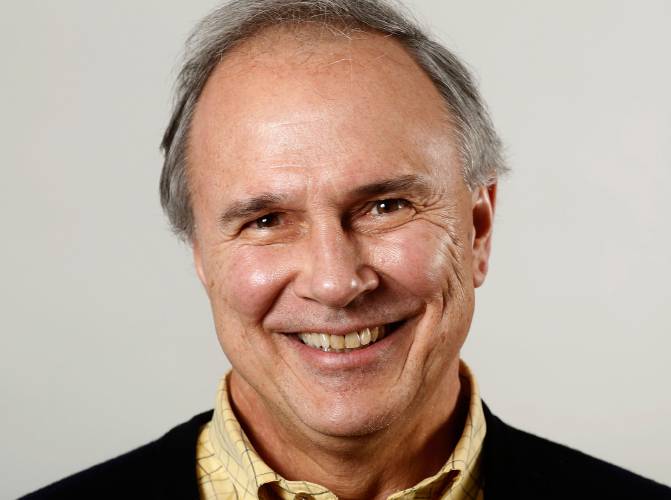
Jim Kenyon. Copyright (c) Valley News. May not be reprinted or used online without permission. Send requests to permission@vnews.com. Geoff Hansen
| Published: 02-25-2024 10:01 PM |
What is Dartmouth President Sian Leah Beilock so afraid of? I thought she’d welcome the opportunity to enter into the public record her administration’s reasoning for having two student activists arrested for criminal trespass while peacefully protesting on the lawn outside her office.
Apparently not.
Last week, Beilock was subpoenaed by Kira Kelley, the attorney representing the two students pro bono, to testify in Monday’s trial, scheduled to start at 1 p.m. in Lebanon District Court.
Michael Delaney, a Manchester attorney with McLane Middleton — one of the college’s outside law firms — quickly filed a motion to quash the subpoena.
On Thursday, Judge Michael C. Mace, who is presiding over the case, denied the motion. Mace didn’t offer an explanation for his decision.
But the judge really didn’t need to. The college’s feeble attempt to get Beilock out of testifying speaks for itself. “President Beilock has no relevant testimony that she can offer in these cases,” Delaney wrote.
Is the public — and the judge — expected to go along with the Dartmouth charade that Beilock had nothing to do with freshman Kevin Engel and junior Roan Wade being taken away in handcuffs by Hanover police?
The college didn’t respond to my email seeking comment on the case.
Article continues after...
Yesterday's Most Read Articles
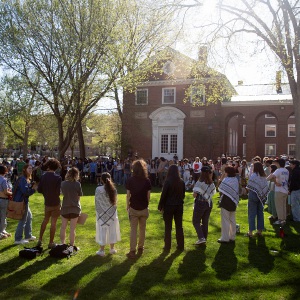 Dartmouth administration faces fierce criticism over protest arrests
Dartmouth administration faces fierce criticism over protest arrests
 Three vie for two Hanover Selectboard seats
Three vie for two Hanover Selectboard seats
 A Look Back: Upper Valley dining scene changes with the times
A Look Back: Upper Valley dining scene changes with the times
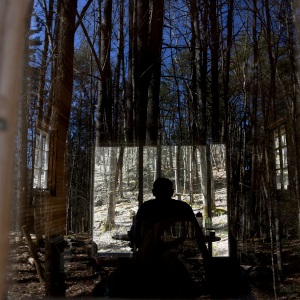 Norwich author and educator sees schools as a reflection of communities
Norwich author and educator sees schools as a reflection of communities
In his motion, Delaney argued that forcing Beilock to testify could lead to “confusing the issues, undue delay or wasting time.”
Whose time? Dartmouth seems to think Beilock’s time is too valuable to appear in court, but it doesn’t have a problem with taxpayers footing the bill for an unwarranted prosecution.
Engel and Wade are the ones who have a lot to lose. Criminal trespass, the misdemeanor they’re charged with, carries no jail time. But if convicted, they’ll still be saddled with criminal records that could hurt them when applying for graduate school or jobs. (Court documents use Wade’s birth name, which she’s in the process of legally changing. On campus, she’s already known as Wade.)
Engel and Wade were protesting to bring attention to the plight of everyday Palestinians in the Israel-Hamas war. They also demanded the college make progressive policy changes, including divesting its endowment from “Israeli apartheid” organizations.
But what the students viewed as exercising their constitutional rights became an inconvenience for Beilock and her top lieutenants. So they called in gun-toting cops.
When Engel and Wade refused to leave a camping tent pitched outside Parkhurst Hall after about six hours, Hanover police arrested the pair around 1 a.m. on Oct. 28.
The subpoena also requires Beilock to bring any documents that “engendered (her) belief that the two students were planning to engage in ‘physical action’ ” before their arrest.
Shortly after the arrests, Beilock sent out a lengthy email to the “Dartmouth community” in which she shared details — or at least the college’s version — of what had happened.
About 15 students had put up a tent in front of Parkhurst “despite being informed that this was a clear violation of campus policies,” she wrote.
“The situation changed when (Engel and Wade) entered the tent and threatened in writing to ‘escalate and take further action,’ including ‘physical action,’ if their demands were not met.”
As Kelley wrote in her successful objection to quash the subpoena, the “statement indicates that President Beilock’s office was involved in decision-making around the initiation and prosecution of this case.”
Beilock’s claim that the two students had threatened physical action was “disingenuous,” Kelley wrote. The president was referring to a 2014 statement written by then-students active in the social justice movement and reissued last year.
Beilock’s email the day after the arrests “evinces that these cases are not about enforcing laws or campus policies but about suppressing protected First Amendment activity,” argued Kelley, a 2011 Hanover High graduate who is now a staff attorney with the nonprofit Climate Defense Project in Minnesota.
In downplaying its overreaction to a benign protest, Dartmouth has received plenty of help. Hanover officials, starting with Town Manager Alex Torpey and Police Chief Charlie Dennis, have covered the college’s flank from the outset.
To obtain a copy of the police report under New Hampshire’s public records law, I filed a right-to-know request with the town on Dec. 20.
The town has stonewalled for more than two months. Hanover, through its attorney, went to Grafton County Superior Court on Jan. 20 to ask a judge to decide whether the arrest record could be released, well aware that a decision was unlikely before Monday’s trial.
Longtime Valley News attorney Bill Chapman, of Orr and Reno in Concord, continues to argue on the newspaper’s behalf that arrest records, which other New Hampshire municipalities are quick to hand over, are public record.
Hanover prosecutor Mariana Pastore, is running interference for the college as well.
On the same day that Delaney filed the college’s motion to quash Beilock’s subpoena, Pastore was right behind with a motion of her own to keep the president off the witness stand. Pastore wrote that Beilock’s “opinion played no part in the State’s arrest or charging decisions.”
Is Beilock willing to testify to that?
We’re about to find out. Or maybe not.
On Saturday Delaney, the college’s attorney, filed a new motion, requesting the judge allow Beilock to put off her testimony to a later date. “President Beilock has recently returned to New Hampshire and has long-standing professional commitments with multiple parties in the coming week,” Delaney wrote.
Too busy to spend a couple of hours in a Lebanon courtroom just down the road from the Dartmouth campus? That’s hard to believe.
Just as hard as Dartmouth having two of its students arrested for staging a peaceful outdoor protest on their own campus.
Jim Kenyon can be reached at jkenyon@vnews.com.

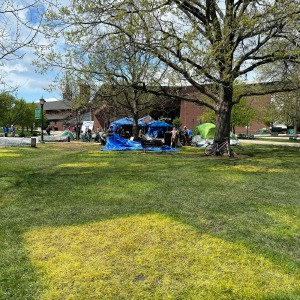 Students take down pro-Palestinian encampment at UVM
Students take down pro-Palestinian encampment at UVM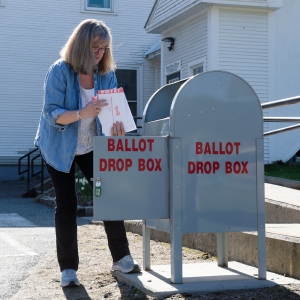 Sharon voters turn back proposal to renovate school
Sharon voters turn back proposal to renovate school
